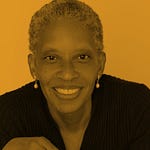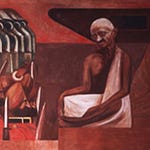Tristan Taormino’s new memoir A Part of the Heart Can’t Be Eaten combines her relationship with her father who died from AIDS, coming into her own queer identity, and becoming the sex educator and porn creator that she is today.
As her astrologer who read her birth chart explained, Tristan is living in her dharma.
There’s a beautiful theme of learning to trust her intuition throughout the book, and I asked Tristan about this. How do we learn to build a sense of intuition? You’ll find some of the highlights about this topic below.
Listen to the full episode for more about relationships with dykes, acknowledging and exploring power dynamics, what it means to be a spiritual leader, and more.
About My Guest
Tristan Taormino is a writer, speaker, sex educator, and host of the podcast Sex Out Loud. A former syndicated columnist for The Village Voice, she is the author of numerous books, including Opening Up: A Guide to Creating and Sustaining Open Relationships, Down and Dirty Sex Secrets, and The Ultimate Guide to Anal Sex for Women. She is the founding editor of the annual Best Lesbian Erotica anthologies, editor of The Ultimate Guide to Kink: BDSM, Role Play, and the Erotic Edge, and coeditor of The Feminist Porn Book: The Politics of Producing Pleasure. Taormino has won four Lambda Literary Awards and eight Feminist Porn Awards. She lives in Los Angeles.
Highlights From the Episode on Cultivating Intuition
There’s No On Or Off Switch
“We talk a lot about trusting other people … and how to build trust with people in relationship, but we don't necessarily talk a lot about building trust with ourselves. Saying, this feels right, and I need to trust that I know what's best for me, or I know that I need to turn the page, or I know what my body needs,” Tristan explained.
She talked about how in the sex education world, we often miss a step by telling folks to trust their bodies, trust what they desire — but what happens when we don’t know what we want? Or what happens if we don’t know how to listen to our bodies?
I think that building intuition and building self-trust are one in the same.
For (cough) decades, I thought that intuition was this thing I was supposed to just magically possess. Like if I sat quietly with myself I could hear what my gut was telling me. We talk about it like that. “Just trust your gut!” As if it’s something we’re just supposed to know how to do.
A HUGE realization was figuring out that intution is actually something you learn to build over time.
It took away so much imposter syndrome around intuition. I didn’t have to trust my body, my inner monologue, any effing message I believe I’m sending myself. I can learn to discern which messages I want to follow through practice.
So what does this practice look like?
Identify the Sources of Your Inner Voices
Another myth is that we have one inner voice. Nope! We have many. And part of learning to trust ourselves is being able to distinguish between all of these inner voices and learning which ones are helpful.
Tristan describes identifying the inner critic: “We've got to just take steps to sort of recognize that and go, ‘Oh, I know who you are, and you're not the best source of information, actually.”
She offered the example of body hate. “When you look in the mirror and you hate your body. You were not born hating your body. That is absolutely what society wants you to do by setting up these standards of what a body should look like, what a desirable sexy body is, and how can we not internalize that we're swimming in it.”
Intuition develops as we separate out cultural messages from that which feels more innate and loving. But even those loving messages aren’t always straightforward.
Trust the Paradox
“I think we should be less afraid of the paradox,” Tristan explained. She brought up dialectical behavior therapy, which is all about recognizing that two opposing perspectives can be true at the same time.
“We're really into binaries, and we're really into checkboxes, and we're really into: what do you want? Here's the menu. You can't have two things. You have to have one thing. And I want to live in a world where we can embrace both the both part. And so it doesn't seem like there's chaos in our brains or in our hearts or in our souls, right? Because I think when we hear all the voices, what does it sound like? It sounds like chaos. It does not sound like clarity at all. And sometimes you just have to sit with that for a minute and then decide, okay, I'm having these multiple feelings. Some of those things feel contradictory. How do make sense of this and move forward?”
What happens when we accept multiple things are true at once? Relief. Ahah moments. Smoother relationships. More self-compassion. It’s a little magical.
(BTW, I highly recommend this Mindful Poly podcast episode on dialectic thinking.)
Trust Isn’t All Or Nothing
And what about experts? Even folks whose opinion we trust 90% of the time. What happens when they say something that feels off? In the book, Tristan talks about going to see a healer who seemed wise in so many ways, but when it came to reading Tristan’s gender, they were off.
Tristan writes about the experience: “‘The masculine and the feminine are at war within you,’ he said confidently. Then I heard the sound of the record scratch. Wait, what the actual fuck?
“Later I realized, if he was reading my aura or sensing my energy or whatever his particular process was, he was seeing the masculine and feminine in me. So he got that right. Through his heteronormative, deeply gendered lens, he interpreted what he saw as ‘war’ because, for him, gender was a binary with clear borders. A psychic with a different perspective might have said, ‘Oh, you have a complicated gender.’ Or a really good one would say, “’You’re a femme.’”
I asked Tristan how she learned to be discerning of what perspective she trusted. Here’s what she said:
“Can people see things in us? Absolutely. Absolutely. But their interpretation is going to be based on their worldview. They're going to interpret it in very specific ways. And so we have to save room there for the interpretation to not make sense to us or to not reflect who we believe that we are. We can think critically about people with deep, deep wells of knowledge and gifts that I don't have.”
















Share this post